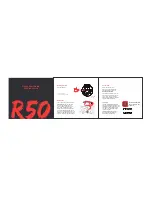
6
• Hot and humid places should be avoided. Particular care should be taken
regarding vehicles, which can become very hot inside.
• Ensure that the camera is not subjected to substantial vibrations, shocks,
or pressure as this may cause damage, malfunction, or a loss in waterproof
performance. Place the camera on a cushion for protection when the
camera is subjected to the vibrations of a motorbike, car, ship, etc. If the
camera is subjected to substantial vibrations, shocks, or pressure, take
your camera to your nearest service center and have it checked.
• The temperature range in which the camera can be used is -10°C to 40°C
(14°F to 104°F).
• The liquid crystal display will become black at high temperatures but will
return to normal at normal temperatures.
• The response speed of the liquid crystal display becomes slow at low
temperatures. This is due to the properties of the liquid crystal and is not
a malfunction.
• If the camera is subjected to rapid temperature changes, condensation
may form on the inside and outside of the camera. Therefore put
the camera in a bag or plastic bag and take the camera out when
the difference in temperature has subsided.
• Avoid contact with garbage, mud, sand, dust, water, toxic gases, or salts.
These could cause the camera to breakdown. Wipe the camera to dry
off any rain or water drops.
• Please do not press forcefully on the display. This could cause it to break
or malfunction.
• Be careful not to sit down with the camera in your back pocket as this may
damage the exterior of the camera or the display.
• When using a tripod with the camera, be careful not to overtighten
the screw in the tripod socket on the camera.
• Do not clean the product with organic solvents such as thinner, alcohol
or benzene.
• Use a lens brush to remove dust accumulated on the lens. Never use
a spray blower for cleaning as it may damage the lens.
Cautions when Carrying and Using the Camera
About Repairs
WG20_OPM_ENG.book Page 6 Wednesday, February 5, 2014 2:20 PM








































